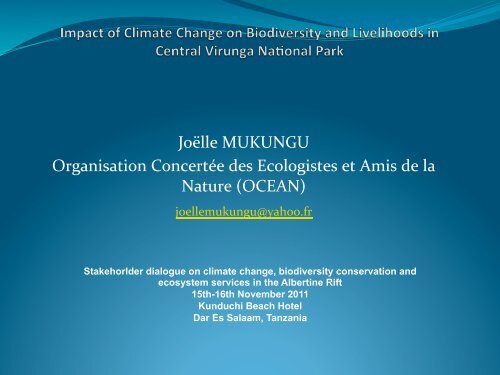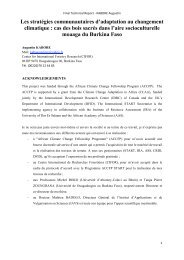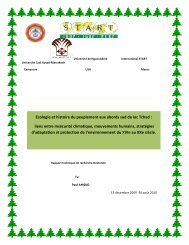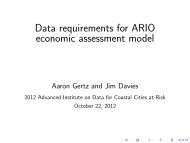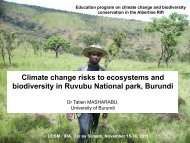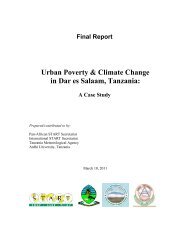Joëlle MUKUNGU Organisation Concertée des Ecologistes et Amis ...
Joëlle MUKUNGU Organisation Concertée des Ecologistes et Amis ...
Joëlle MUKUNGU Organisation Concertée des Ecologistes et Amis ...
Create successful ePaper yourself
Turn your PDF publications into a flip-book with our unique Google optimized e-Paper software.
<strong>Joëlle</strong> <strong>MUKUNGU</strong><br />
<strong>Organisation</strong> <strong>Concertée</strong> <strong>des</strong> <strong>Ecologistes</strong> <strong>et</strong> <strong>Amis</strong> de la<br />
Nature (OCEAN)<br />
joellemukungu@yahoo.fr<br />
Stakehorlder dialogue on climate change, biodiversity conservation and<br />
ecosystem services in the Albertine Rift<br />
15th-16th November 2011<br />
Kunduchi Beach Hotel<br />
Dar Es Salaam, Tanzania
Introduc)on<br />
• This presentation is the summary of the externalship<br />
reasearch lead in October-December 2010, in the s<strong>et</strong>ting<br />
of the training on climate change and biodiversity<br />
conservation in the Albertine Rift region<br />
• Team contributors: Luc Lango (Tayna Center for Biology<br />
Conservation), Hermest Mushayuma (Centre de<br />
Recherche en Sciences Natureles/Lwiro), Kakogozo<br />
Bombi (Centre de Recherche en Hydrologie) and I from<br />
OCEAN<br />
• The research was lead in the central section of virunga<br />
national park (Rwindi station)<br />
• Supervisor: Dr Arthur Kalonji<br />
• Host Institution: Tayna Center for Biology Conservation<br />
in Goma
Objec)ves<br />
• To assess stakeholders’ perceptions of Climate<br />
change;<br />
• To assess the climatic change and non climatic<br />
change threats on large mammals and the<br />
interaction or link b<strong>et</strong>ween them;<br />
• To assess the impact of climatic change threats on<br />
livelihood; and<br />
• To assess adaptation strategies developed by<br />
local communities and Park manager for a<br />
sustainable park management
M<strong>et</strong>hodology<br />
Individual interview Focus group
Study Area<br />
339.173ha, 144.548<br />
lake Edward<br />
• Six villages<br />
have been<br />
choosen<br />
(Visthumbi,<br />
Lunyasege,<br />
Rwindi,<br />
Kanyabayonga,<br />
Nyamilima and<br />
Kiwanja)<br />
• 107 heads of<br />
households<br />
were<br />
interviewed<br />
!
Finding and observa)ons<br />
Few impact on large mammals due to climate change in the<br />
point of view of stakeholder<br />
Notification of variation on climate factors: temperature has<br />
encreased while rainfall is perturbed<br />
Non climatic change threats have impacted large mammals:<br />
war, poaching, deforestation, invasion of the park by local<br />
communitie and armed troops<br />
Hippopotamus, elephants, buffalos and antelops are the more<br />
threatned mammals<br />
Difficulties to provide ecosystem services and good to<br />
contribute to human wellbeing<br />
Conflits b<strong>et</strong>ween local communities and park managers
Impact on livelihood<br />
Activities: agriculture, fishing, carbonisation, smoking<br />
and salted fish<br />
Impact of climate change: decreasing on production
challenges<br />
Mangement of all the park is undre ICCN (Institut<br />
Congolais de Conservation de la Nature)<br />
ICCN is making effort to manage well the park (Remove<br />
armed troops from the park,<br />
An alternate arrangement has now been made b<strong>et</strong>ween<br />
ViNP and Forces Armées de la République Démocratique<br />
du Congo (FARDC) to assume park control.<br />
Intervention of parteners NGO such as WWF with action<br />
that contribute to reduce conflits b<strong>et</strong>ween park and local<br />
communities<br />
Lack of m<strong>et</strong>eorological data, monitoring system of animals<br />
Growth on population and political instability
Recommanda)ons<br />
Integrate climate change issues in the management<br />
plan of the protected area<br />
Increase policy will for conservation and<br />
management of the park<br />
Monitoring changes on climate param<strong>et</strong>ers<br />
(M<strong>et</strong>eorological stations and infrastructure must be<br />
restored over the entire park)<br />
Further research must be conducted on climate<br />
change impacts on biodiversity within the park;<br />
Raising awareness of all stakeholders on climate<br />
change issues


